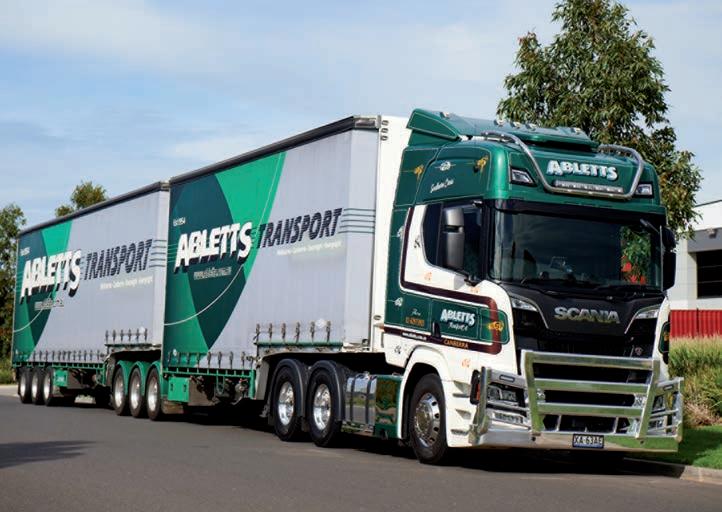
12 minute read
How the West Was Won
H O W T H E WEST WAS
WON
From fulfilling a mechanical apprenticeship with Perth Isuzu dealer Major Motors in the 1970s to building a major national plant hire business incorporating a brace of Isuzu trucks, Doug Brooks has witnessed the complete rise to domination of the Japanese truck brand over the past 45 years.
Brooks Hire has invested heavily in the F Series 350hp models with Allison automatic transmissions.
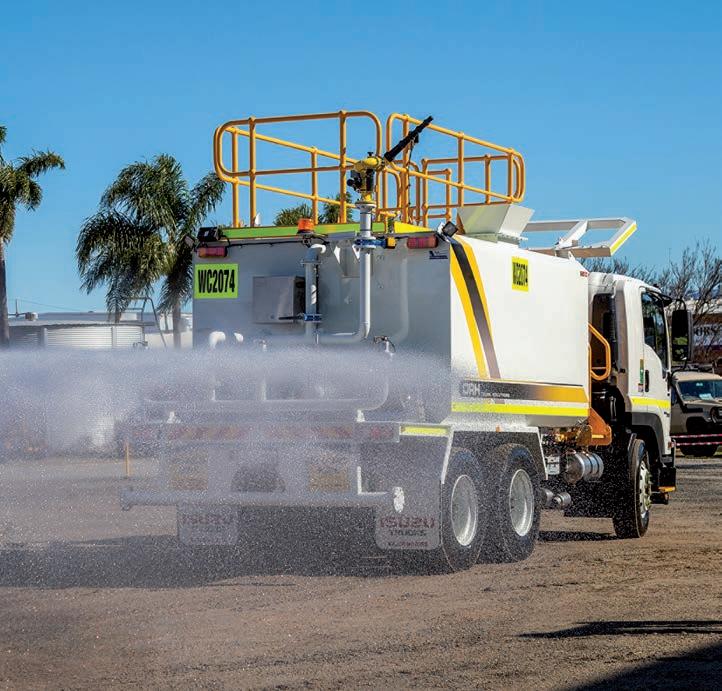
When the founder and CEO of Brooks Hire Service started his mechanical apprenticeship with Major Motors in 1972, Isuzu trucks were little more than a fleck on the far horizon in Australia. In those now distant days British Bedford trucks and light commercials ruled the roost at Majors, but it didn’t take long for the keen-eyed young Brooks to recognise the superior quality of the Isuzu products when they started rolling into the workshop during his third year. “There was a lot more attention to detail on the Isuzus compared with the Bedfords,” Doug says. If there was a hose that ran along the chassis of the Bedford he recalls, it would be P-clamped every 1.5 metres whereas with the Isuzu it would be P-clamped every 300mm. “It actually took longer to work on the Isuzus because you’d have to undo all the extra P-clamps, but in saying that the hoses wouldn’t chafe like they did on
Equipment is fitted with hazard lights, rotating beacons, fire extinguishers and reverse alarms for mine spec.
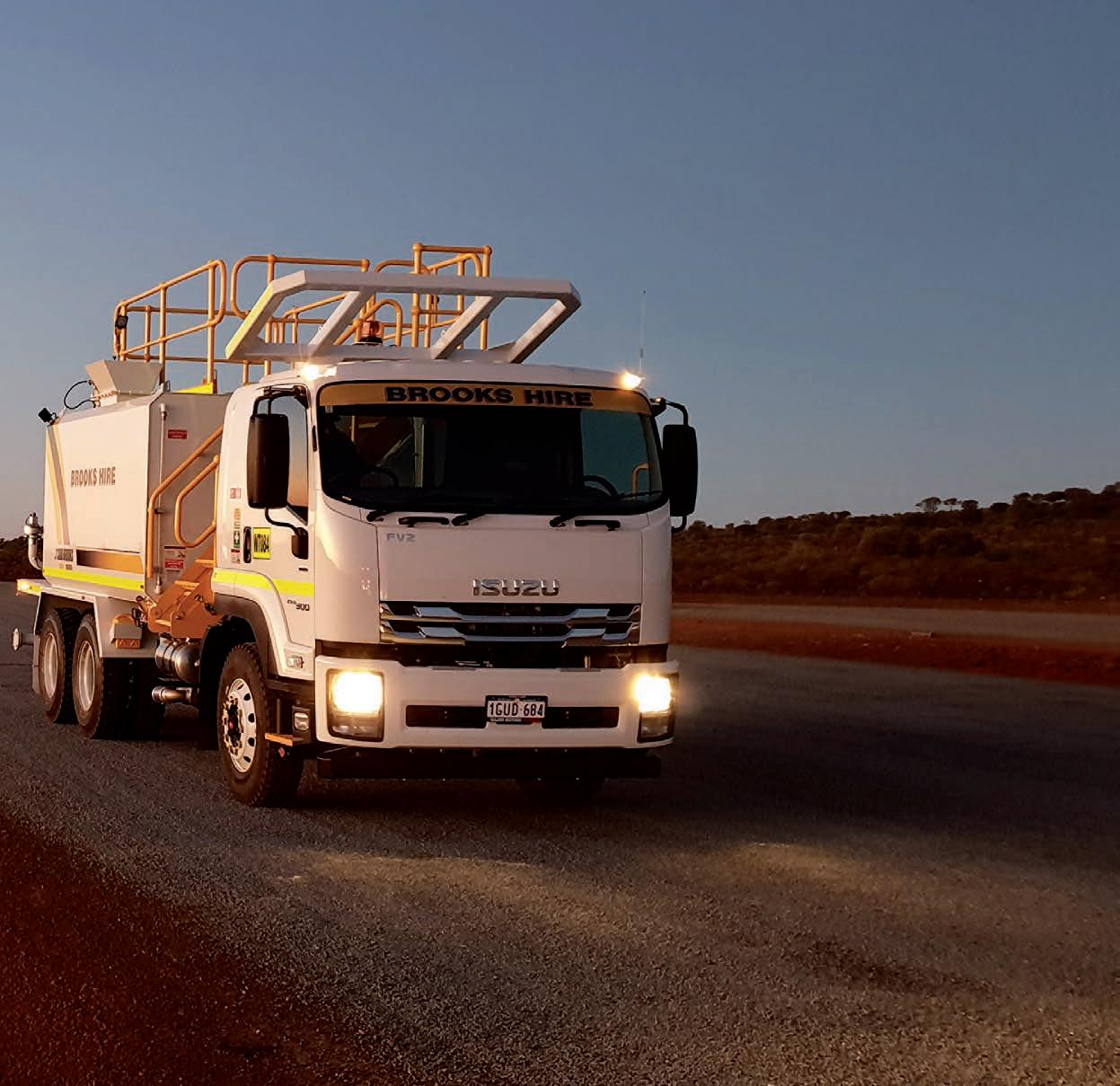
the Bedfords, so in the end the Isuzus were far more reliable.” Doug’s passion for machinery and his desire to become a mechanic started at the age of four, he says, and he purveys a depth of gratitude towards Major Motors for giving him his first big break in life. He grew up at Katanning, about 300km south-east of Perth, and worked on a farm for a year before starting with Majors. “Since those early years I’ve always had a soft spot for the Isuzu products, and the fact Major Motors put me on was a big thing for me,” he says. “When I started I was earning $23 per week and board was $15 per week so to save money I lived in my panel van near the dealership — I was always the first one to arrive at work.” Doug’s mechanical experience while at Major Motors also extended to larger diesel engines as the company was at the time an agent for Detroit Diesel. “It was great experience because we overhauled the Detroit Diesels right down to the last nut and bolt,” he says. “We
Doug Brooks CEO Brooks Hire Service
would rebuild the 16V149 series engines from the Hammersley Iron ore trucks and then test run them on the dynamometer which was a real buzz.” It was this Detroit leaning that enabled Doug, after completing his apprenticeship, to work for a company called Air Drill 77 in Perth. Then in 1978 he moved to Barrow Island off the Pilbara coast, working for West Australian Petroleum (WAPET), a company later bought by Chevron. While still working at Barrow Island in 1979, Doug purchased two air compressors on Bankcard and proceeded to hire them out, thus founding Brooks Hire. “In those days at Barrow Island the standard practice was to work three weeks then have a week off. But I used to work five weeks and have three days off so I could get ahead,” he recalls. “I paid off the two compressors before leaving WAPET and set up my fledgling hire business at Eneabba in 1980.” Nestled in the heart of WA’s spectacular wildflower region, Eneabba is a small town about 300km north of Perth that was established in 1961 to service a large mineral sand mining operation located south of the township. Here Doug set up his business to cater to the needs of the mines, hiring out the compressors, self-priming pumps and 400amp electric arc welders.
In 1982 Doug purchased, by tender, his first unit of mobile plant – an eight-tonne JEC crane – which he drove from Perth to Eneabba. At the time, he was operating the business from a shed at Eneabba, working 18-hour days and living five days a week in a humpy behind the shed. “In addition to hiring plant and pumping equipment to the mining companies, I was also doing mechanical repairs for them as well as rebuilding Detroit Diesel engines and using the profits to purchase new equipment to hire out,” Doug says. “That’s how I built up the business.” Brooks Hire now has over 3,000 units of plant equipment available for hire through its nationwide network of branches. The equipment includes
Since 2008 Brooks Hire has purchased an estimated 120 Isuzu vehicles. “Water trucks operate at relatively slow speeds in off-road conditions which means the burn-off of the DPD needs to be done manually. As these vehicles often have multiple drivers, sometimes they neglect to manually activate the burn which can lead to issues with the DPD getting choked up with soot.”
Doug Brooks CEO Brooks Hire Service
backhoes, rock breakers, dozers, dump trucks, excavators and attachments, forklifts, fuel trucks, graders, light towers, loaders, rollers, service trucks, side tippers, skid steers, tele handlers, tip trucks, tool carriers and water trucks. Prior to delivery, every machine is thoroughly checked by experienced staff

to ensure everything is operating correctly. For mining applications, equipment is fitted with hazard lights, rotating beacons, fire extinguishers and reverse alarms in accordance with mine spec regulations. Clients are able to hire low-hour, late model equipment on short-term, longterm or permanent hire with full back-up service from the company’s trade qualified staff. To facilitate on-time delivery of plant equipment, Brooks Hire Service has five modern low loaders in the fleet and avails of a number of conscientious subcontractors to tow them. Interestingly, it took quite a while before Isuzu trucks made their first appearance in the Brooks Hire fleet, with Doug saying the first units were bought in 2008. At this point the range of hire equipment was considerably broadened to include a range of tippers, table-tops, water trucks and 4WD service trucks. Doug describes the Isuzu products as solid, reliable and relatively trouble-free. “They’re a good truck — we don’t have a lot of problems with them. I think over the last few years we have bought around 120 Isuzus in various sizes and guises,” he says. “We’ve been buying quite a few of the larger F Series 350hp models with Allison automatic transmissions including sixwheel FXYs and FXZs and eight-wheel FYs for water truck applications.” Doug adds that the addition of a Diesel Oxidation Catalyst (DOC) rather than the Diesel Particulate Diffuser (DPD) used on the smaller F Series variants is a major advantage. “Water trucks operate at relatively slow speeds in off-road conditions which means the burn-off of the DPD needs to be done manually. As these vehicles often have multiple drivers, sometimes they neglect to manually activate the burn which can lead to issues with the DPD getting choked up with soot,” he says. “We’ve found the 350hp engine with the DOC to be the best choice for our water trucks because there’s no requirement for the manually-actioned burn.”
Isuzu FVZ rigid 350hp.
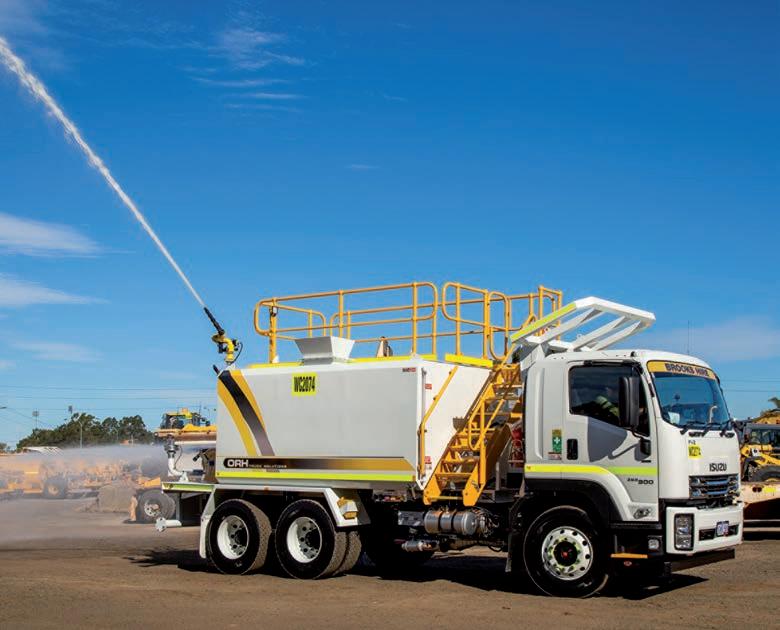
A number of other features, as Doug describes it, make the larger F Series units ideal for the demanding applications common to hire trucks. “We’re finding these units to be particularly bullet-proof as they have the heavy-duty Meritor steer and drive axles and driveline components,” he says. “The driver-controlled cross locks on the drive axles is a very useful feature on the water carts.” Aside from his penchant for trucks and earthmoving machinery, Doug has an equal passion for aircraft and does, in fact, half own an aviation company that specialises in repatriating ill Aussies from overseas locations in southeast Asia, including tourist hotspots such as Bali. As for the future of Brooks Hire, reputedly the largest privately-owned plant hire company in Australia, there are now 16 branches spread around every state and territory except Tasmania and the ACT. What’s more, Doug’s two children are now firmly entrenched in the family business – son Stuart as Managing Director and daughter Lenore as Hire Manager – a factor Doug recognises as essential to its continued growth and long-term success. “Stuart and Lenore have done well in recruiting the right people into our company. They’ve brought with them the younger technology like computer and communications skills we need to keep the business growing,” Doug says. “This combined with my wisdom and experience gained over the last 45 years is a good mix — you’ve got to have that blend of youth and maturity to keep moving forward.” Doug acknowledges that he has been fortunate to build a business around something he is interested in and enjoys doing. “It’s been a lot of hard work but I still enjoy it and regard it as something of a hobby,” Doug says. “Every day I’ve woken up over the last 40 years I’ve been enthusiastic and interested to find out what new challenges and accomplishments can be achieved.”
VENTURE CAP ITA L
Ablett’s Transport, an Australian-owned family business, has been operating successfully in the Canberra region for almost 60 years.
An iconic business in the Canberra area, Ablett’s Transport has operated in the local region since 1962. The founding of the company is perhaps less well known. It was actually started in Victoria by Arthur Ablett in the Gippsland town of Drouin back in 1954. Having taken over a division of MayneNickless during the 1980s, the company commenced a long running involvement moving eight to nine loads of sawn timber a day from a mill in the Canberra suburb of Hume. Road transport businesses in the Canberra region have long been confronted with a challenge. The imbalance between the levels of freight coming in, versus the amount of freight heading out of the area. Consignments of items such as timber can be loaded from Tumut in the Snowy Mountains and Bombala in the Monaro region and it is no surprise that Canberra generates plenty of wastepaper for Ablett’s to transport to recycling centres. A local client in Queanbeyan has a niche manufacturing operation which exports ladders to the Netherlands in 20-foot containers which Ablett’s transfer to the ports. In addition to its Queanbeyan/Canberra facility, Ablett’s maintains depots in Melbourne and Sydney and also regularly has its trucks in Brisbane. Since 1995 Ablett’s has been a part-owner of Combined Distribution Management, better known as CDM Logistics, which, as its name implies, provides single contact logistics management for clients across several local transport operators. Clients include the local branches for a number of well-known national retail chains.
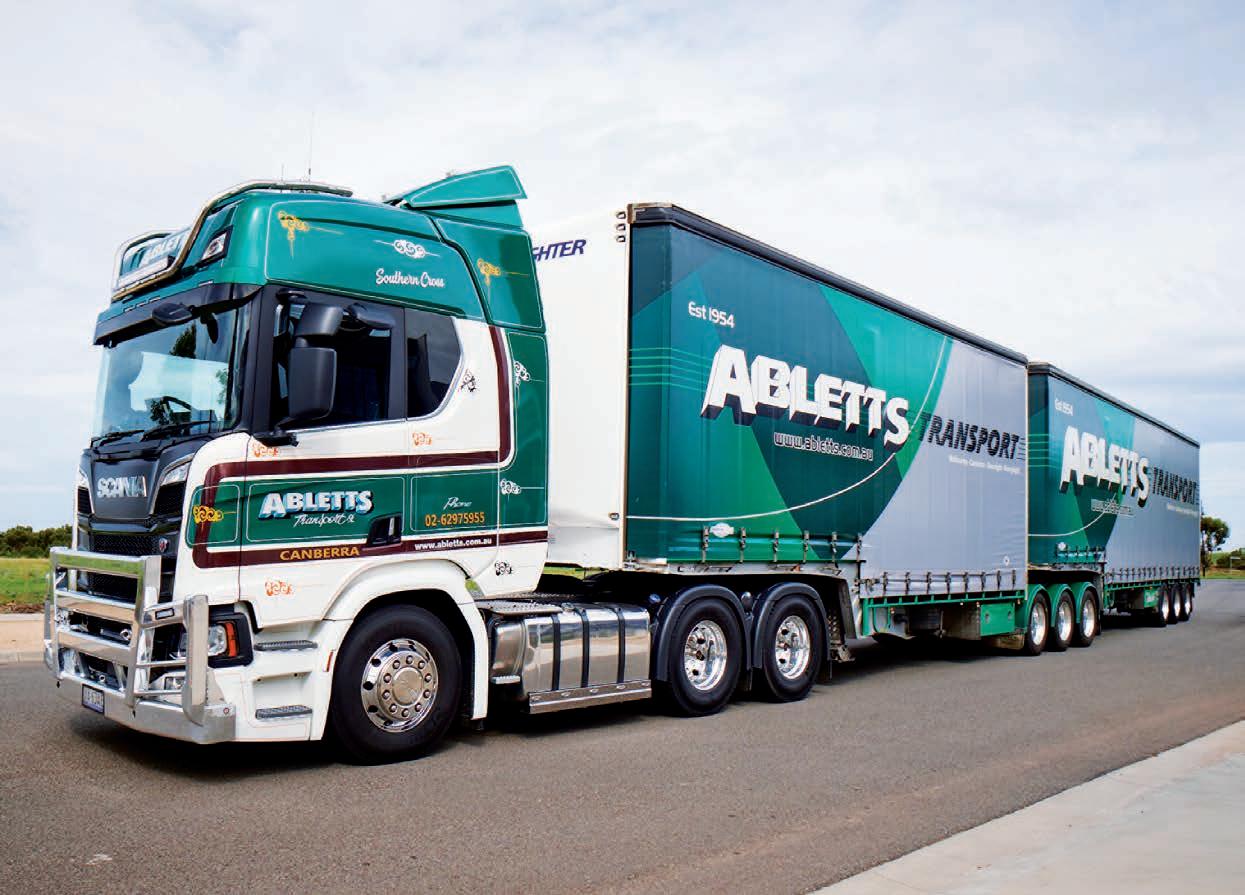
Scania R620 V8, one of 35 prime movers in the Ablett’s fleet.
Ablett’s driver Steve Johnson.

Other freight transported by Ablett’s includes building materials such as tiles, bricks and nylon sprinkler pipe. An allterrain forklift enables direct deliveries to locations such as construction sites. Construction of the Snowy 2.0 hydroelectric scheme is also expected to present some opportunities for the company over the next five years. With almost 70 years of history, Ablett’s have operated many brands of trucks from Arthur Ablett’s original Leyland Comet to the latest Kenworth, DAF and Mack models with several V8 Scania’s joining the fleet in recent times. “Scania made it easy for us with the test trucks,” says Duncan Ablett. “It’s important we win the drivers over. We gain acceptance by putting drivers in the trucks and letting them see for themselves what they can do. You’re not going to win everyone over, but we have people keen to try something new. Canberra is known for its high cost of living and high cost of real estate and services can be expensive here and Canberra is not what you call a ‘truck town’ but there are always people who want to be a truck driver and we’re fortunate to have some long term drivers.” One such driver is Steve Johnson, who operates a Scania B-double on the Canberra-Melbourne route and enthusiastically praises the Scanias’ overall performance and ability to maintain a higher average speed which reduces trip times. “The full air suspension with onboard weight scales make it the most comfortable option with reduced noise, vibration and roughness all adding to reduced fatigue and the benefit is a healthier, happier driver,” says Steve. Drivers do need advice, according to Duncan, on how to get the best out of the new trucks given the changes and prevalence of technology. “Truck salesman need to do more now than they used to and can’t just drop a new truck off,” he says. “Most drivers may just want to get from A to B, yet some guys are really conscious of fuel savings.” That has resulted in a noticeable reduction in fuel usage per trip of up to 17 per cent. Steve is saving the best part of an hour on each tip, too. Ablett’s is both NHVAS and TruckSafe accredited and operates a well-equipped and staffed in-house service division. The Scania’s have five years/500,000 maintenance included in the package with the added convenience of the Scania service agent being just up the road. “That’s all really easy for us,” says Duncan. “Just one phone call. The trucks are home every second day so anything that needs doing can be done straight away.” Consistency of work and trying to flatten the curve across the peaks and troughs of demand is an almost universal challenge for transport operators across Australia, and one that the entire Ablett team works to address. “It’s about not having too many vehicles in the quiet times and making sure there are enough when we’re busy,” says Duncan. During the ‘oil shock’ of the 1970s, the fleet was cut back to just three or four trucks and today has grown to around 35 semis and B-doubles plus another 21 rigids. As a family owned and operated company, Ablett’s Transport continues to take pride in looking out for its customers and staff at a personal level.
This Scania B-double has been assigned linehaul duties to Melbourne.
